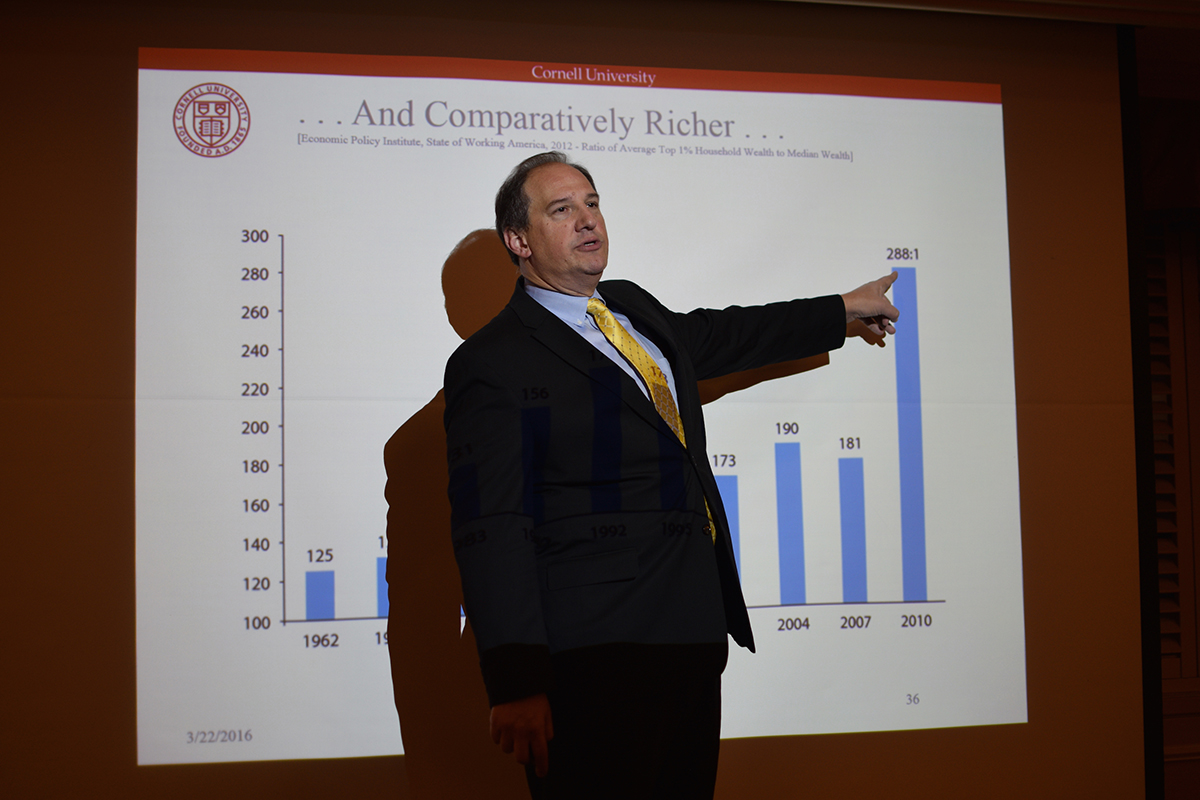Economy drives the 2016 presidential election, alum says
By Kristen Tauer

Blame it on the economy. With a majority of Americans dissatisfied with the state of the country, Seth Harris ’83 considers the economy a major catalyst for the current contentious climate of the 2016 presidential election.
A former acting secretary of labor under President Barack Obama and distinguished scholar at the ILR School, Harris delivered a talk on “America’s Economy and the 2016 Election” March 22 at the Cornell Club in New York City.
While Harris noted the economy is not the only issue driving the 2016 election – racism, sexism, sexuality, religion, authoritarianism, geography, ideology and party identity all are involved, as well – he argued that changes in the economy are the greatest source of anxiety and anger among the electorate, and are the strongest agent influencing many people’s political views.
Exit polling of Republican primary voters showed many are angry and disaffected; three-quarters of all Americans say they are dissatisfied with the state of the country; and almost two-thirds believe that the country is on the “wrong track.”
“People are pretty unhappy,” said Harris. “They think things are not going well, and haven’t been for a long time, and it’s influencing the way they’re voting, the way they’re going to vote going forward and, more broadly, their political perceptions of the United States.”
Harris presented possible theories for the sources of that anxiety and anger: dramatic job loss and foreclosures during the Great Recession; many are worried about dropping out of a shrinking middle class; and income and wage inequality.
The financial collapse of the late 2000s delivered a “gut punch” to the middle class, disrupting many workers’ sense of economic security. “The American worker got hit with a tidal wave,” said Harris. “The economy dropped out from underneath them.” Median household income and home values have still not recovered from that period, when millions lost their homes to foreclosure. Real earnings have also been flat or declining for decades.
“One in seven American workers lost their middle-skill, middle-wage jobs from 1983 to 2012,” said Harris. Technology has eliminated many jobs, and globalization’s dissemination of technology facilitated a massive outsourcing in the textile, steel, rubber and metal industries, among others. Middle-skill workers were left with two options: struggle their way into the high-skill workforce, requiring time-intensive skills development and education many older workers cannot afford, or fall back into a low-skill, low-wage occupation. The influx of workers into the low-skill, low-wage labor market has also driven these workers’ wages down.
With an economy creating widespread anxiety and a feeling that America’s best days are already past, people have lost a sense of control over their economic situation and future, Harris said.
These feelings are steering people toward supporting candidates who present themselves as strong and decisive, but sensitive to their concerns, and who present clear solutions and a vision of a brighter future, and reject the institutions who they believe have allowed the current economic situation to occur.
Bernie Sanders and Donald Trump have molded their rhetoric around being against those institutions, and offering solutions and speaking directly to a better, if not brighter, American future. “Voters want a revolution. Bernie Sanders talks about a political revolution against the powers that be, Donald Trump talks about the politicians being the cause of the problem,” says Harris. “A lot of people are feeling that Trump hears and understands them.”
Harris remained neutral on which candidate may best solve America’s problems but was clear about what American voters are hoping to find: “A better, more achievable future, a clearer solution,” he said. “That to me is the economic underpinning of what we’re seeing in the political electorate right now.”
Kristen Tauer ’10 works as a reporter and editor in New York City.
Media Contact
Get Cornell news delivered right to your inbox.
Subscribe